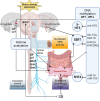New insights into irritable bowel syndrome pathophysiological mechanisms: contribution of epigenetics
- PMID: 37160449
- PMCID: PMC10307698
- DOI: 10.1007/s00535-023-01997-6
New insights into irritable bowel syndrome pathophysiological mechanisms: contribution of epigenetics
Abstract
Irritable bowel syndrome (IBS) is a complex multifactorial condition including alterations of the gut-brain axis, intestinal permeability, mucosal neuro-immune interactions, and microbiota imbalance. Recent advances proposed epigenetic factors as possible regulators of several mechanisms involved in IBS pathophysiology. These epigenetic factors include biomolecular mechanisms inducing chromosome-related and heritable changes in gene expression regardless of DNA coding sequence. Accordingly, altered gut microbiota may increase the production of metabolites such as sodium butyrate, a prominent inhibitor of histone deacetylases. Patients with IBS showed an increased amount of butyrate-producing microbial phila as well as an altered profile of methylated genes and micro-RNAs (miRNAs). Importantly, gene acetylation as well as specific miRNA profiles are involved in different IBS mechanisms and may be applied for future diagnostic purposes, especially to detect increased gut permeability and visceromotor dysfunctions. In this review, we summarize current knowledge of the role of epigenetics in IBS pathophysiology.
Keywords: DNA methylation; Epigenetic; Irritable bowel syndrome; miRNA.
© 2023. The Author(s).
Figures


References
Publication types
MeSH terms
LinkOut - more resources
Full Text Sources

